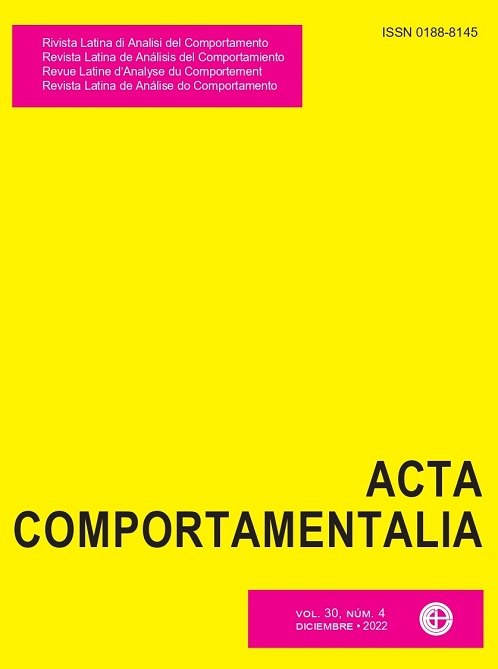The influence of self-monitoring on literary writing: a technological possibility
DOI:
https://doi.org/10.32870/ac.v30i4.83978Keywords:
self-monitoring, literary writing, verbal behavior, experiment, Behavior Analysis, virtual platform, technologyAbstract
The writing behavior is extremely complex, surrounded by multiple variables that can influence its emission. This article aimed to evaluate the use of the self-monitoring (AM) procedure in a professional writer of fictional prose literature. A 22-year-old female student who had already published at least one book participated in the study. The research took six weeks, remotely, through the Tecwriting platform, created with the Center for Application and Information Technology (NATI) of the University of Fortaleza to measure the frequency (VD 1) and number
of written words (VD 2). A single-subject ABAB reversal design was used, consisting of conditions A baseline (without the self-monitoring VI) and B (with the self-monitoring VI), in addition to the application of questionnaires to assess a pre and pos research, as writing pattern and evaluation of extraneous variables. The data obtained point out to an influence of self-monitoring on literary writing, both regarding the frequency of sessions, number of written words, as well as to maintain a more assiduous writing, corroborating the existing literature. Comparing the values of rates obtained, in comparison with base phases, an increase of 24,50% (A1-B2) and 19% (A2-B1) in relation with the VD1 and 126,60% (A1-B2) in B2 and 31,29% (A2-B1) in A2 on VD2. The increased value in A2 can be explained by the production peak, after six weeks without writing. It can be explained by four hypotheses: compensatory behavior, privation, extinction and low self-correction. Due to the complexity of the phenomenon studied, some aspects of this research,
such as the natural and remote context, and the COVID-19 pandemic moment in which the data collection occurred, it is necessary to produce more research to be validated and guarantee the data security of the results found.
Downloads
Downloads
Published
How to Cite
Issue
Section
License

<a rel="license" href="http://creativecommons.org/licenses/by-nc-sa/4.0/"><img alt="Licencia de Creative Commons" style="border-width:0" src="https://i.creativecommons.org/l/by-nc-sa/4.0/88x31.png" /></a><br />Este obra está bajo una <a rel="license" href="http://creativecommons.org/licenses/by-nc-sa/4.0/">licencia de Creative Commons Reconocimiento-NoComercial-CompartirIgual 4.0 Internacional</a>.






